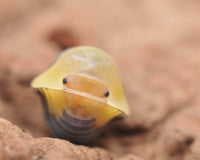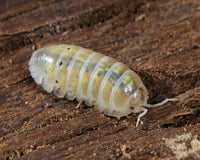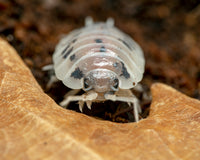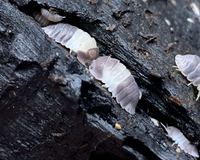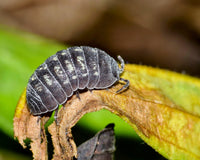Dairy Cow Isopods (Porcellio laevis) have become fascinating Isopods to breed and observe daily. In general, these Isopods seem to be as hardy and robust as their environment and food sources allow them to be.
Dairy Cow Isopods are known simply in the bio-active vivarium and bio-active terrarium worlds as "The Perfect Clean Up Crew." Their voracious appetites have become well known around our hemp farms and our organic composting worm bins for their ability to consume and break down organic matter quickly.
These Dairy Cow Isopods work in a symbiotic relationship with other organic matter decomposers to systematically break down organic matter and, in turn, create an abundance of a healthy and thriving microbial world.
Symbiotic Organic Matter Decomposers

- African Nightcrawler Composting Worms
- Red Wiggler Composting Worms
- Tropical White Springtail Mites
- Tropical Pink Springtail Mites
- Tropical Red Springtail Mites
- Rove Beetles
Dairy Cow Isopods Care
When you first start working with Dairy Cow Isopods, you quickly learn that most of the colony will not fear your presence and will not find it necessary to scurry and find a place to hide.
This Isopod species seems to have virtually no fear as they seem to continually be focused on consuming nutrients to achieve rapid breeding and maintain overall optimal colony health.
Dairy Cow Isopods Food

We have found that with strategic placement of decaying wood, decaying cannabis stalks, decaying cork bark, and decomposing leaf litter, your living soil medium will become alive and thriving.
This allows the opportunistic Dairy Cow isopods to take hold and establish themselves quickly, tolerating a variety of environmental conditions.
Protein Sources: Dairy Cows Isopods seem to devour protein sources literally as soon as we place those protein options in their enclosures. Again we focus on the diversity of these protein sources to ensure an overall healthy and robust colony.
- Freeze Dried Minnows
- Shrimp Pellets (Fish Store)
- Shrimp Meal (Down To Earth)
- Shrimp Shells (Asian Markets)
- Organic (Non-GMO) Nutritional Yeast
- Cricket Insect Frass
Vegetable Sources: Dairy Cows seem to CRAVE certain vegetables for continued rapid breeding and colony health. We have found that we have more success by focusing on vegetables and no longer concentrating on fruit sources.
*Fruit seems to quickly attract fruit flies as well as fungus gnats into the living soil system. Without proper beneficial predatory insects, the fruit begins to cause more issues of imbalance than it solves.
- Organic Sweet Potatoes
- Organic Cucumber Slices
- CBD Hemp Main Growth Stalks
- Freeze Dried Green Beans
- Freeze Dried Peas
Calcium Sources: We have found that the juvenile and mankay Dairy Cow Isopods are continually feeding on cuttlebone calcium sources to improve their overall health, reproduction, and growth rate.
It was also found that they are not as fond of the limestone calcium sources as their Rubber Ducky Isopod counterparts. This allows the Isopod farmer to add several cuttlebone calcium sources to larger enclosures to ensure enough calcium for thousands of Dairy Cow Isopods.
- Cuttlebone (Reptile Store)
- Emulsified Egg Shells (Powder Form)
- Sea Corral Calcium
- Organic Kefir
Pesticide-Free Leaf Litter: For the most part, Dairy Cows enjoy living and resting in large groups under large magnolia leaves or large decaying cork bark. Left alone and to their own devices, these prolific isopods begin to breed like you have never seen before.
- Magnolia Leaves
- Oak Leaves
- CBD Hemp Leaves
- Cannabis Leaves
- Cannabis Flower Buds
Dairy Cow Isopods Breeding

Females: Belly Sided Cavity Between Her Legs
Males: Male Dairy Cow Isopods Do Not Have This Cavity
One of the quickest ways we have rapidly increased Dairy Cow Isopod reproduction rates is to check daily with the number of food levels being consumed.
Food Sources For Faster Dairy Cow Isopod Breeding:
- Organic Cucumber Slices
- Shrimp Meal (Down To Earth)
- Shrimp Pellets
- Organic Mushrooms
- Calcium Calcium CALCIUM!
Staying focused on the daily routine of learning your isopod's nutrient requirements will allow the Isopod farmer the knowledge and experience to eventually push the newly growing colonies by slightly overfeeding.
Dairy Cow Isopods Size
Adult Size: 1.5-2.3 Centimeters
Just as famously as the Dairy Cow Isopod is known for its mobility and speed, newer isopod farmers quickly see how fast these Isopods grow in size after only a short few weeks.
Known as one of the larger and more aggressive isopod species, their size allows them to push around other isopods and their own smaller juveniles, seemingly to let the adults bully more nutrients away from their smaller family members.








